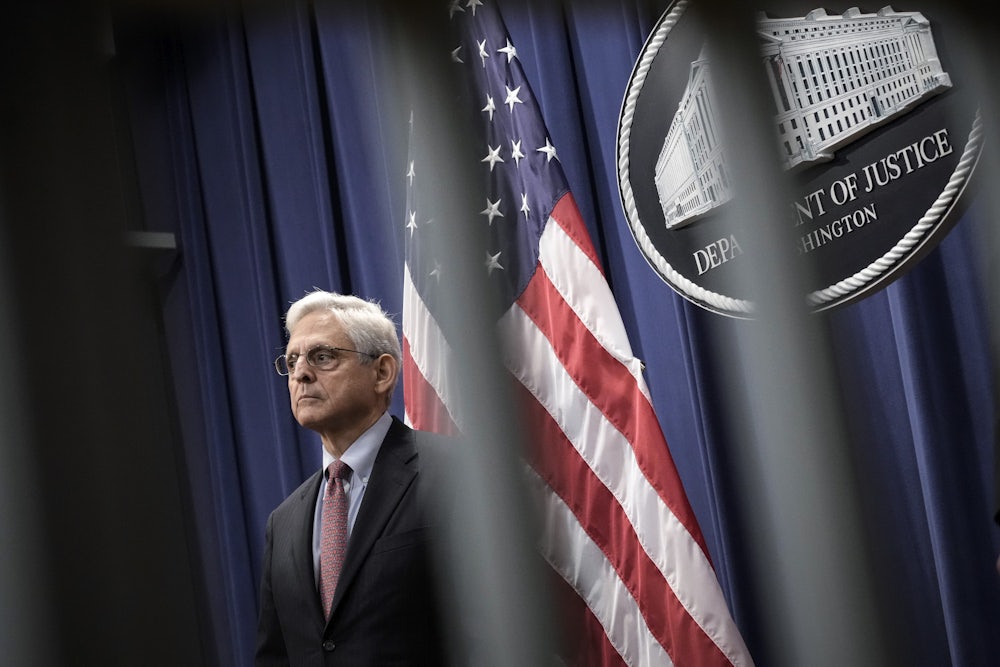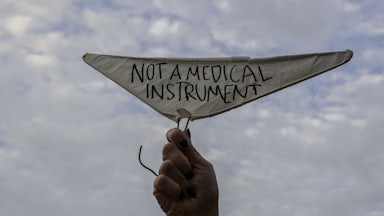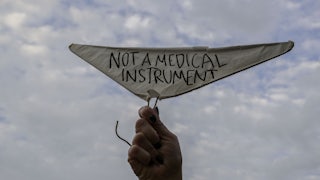In his majority opinion in Dobbs v. Jackson Women’s Health Organization in June, Justice Samuel Alito wrote that the Supreme Court’s decision to overturn Roe v. Wade would return the issue to the “democratic process,” where he thought it belonged. It is unclear whether Alito intended that as a prediction, a command, or both. Either way, abortion rights are having a hard time staying out of the courts.
On Tuesday, the Justice Department opened up the latest in what could be a long line of significant post-Roe legal confrontations when it sued the state of Idaho to block the imminent enforcement of a near-total abortion ban. In court filings, the department claimed that the Idaho law in question would violate a federal law that mandates certain requirements for emergency health care if implemented. The case, United States v. Idaho, is the highest profile effort yet by the Biden administration to defend abortion rights after the high court’s ruling in June.
Attorney General Merrick Garland said that the lawsuit reflected his department’s promise to “advance reproductive freedom” in a post-Roe world. “That is what we are doing, and that is what we will continue to do,” he said in a statement announcing the litigation. “We will use every tool at our disposal to ensure that pregnant women get the emergency medical treatment to which they are entitled under federal law. And we will closely scrutinize state abortion laws to ensure that they comply with federal law.”
Idaho, like many other states, had a trigger law on the books that anticipated the possibility that the Supreme Court would overturn Roe; it is set to go into effect later this month. Idaho’s version of a statewide abortion ban includes a much stricter version of the maternal-health exemption: Instead of allowing the procedure in certain circumstances, it would presumptively criminalize all abortions and allow doctors to raise medical necessity as an affirmative defense when they are prosecuted. This law thus provides a plausible means for medical practitioners to practice life-saving care; in practice, however, the threat of criminal prosecution and the attendant legal expenses will inevitably force medical practitioners, at a minimum, to think twice about the risks involved.
The Justice Department concurred with this assessment: “Physicians facing a threat of criminal prosecution for performing an emergency abortion may be reluctant to perform the procedure—even when their medical judgment leads them to conclude that the procedure is necessary,” wrote the DOJ in its Tuesday court filings. “The loss of that necessary treatment will result in irreversible damage to the health of a pregnant patient in some instances, and in other cases could lead to death.”
The department argued in its complaint that the restrictions violated the Emergency Medical Treatment and Labor Act, a federal law better known as EMTALA. That law defines the minimum level of emergency care that hospitals must provide if they receive Medicare funds, which nearly all do. Its language requires doctors to provide “stabilizing treatment” if a patient’s health is in “serious jeopardy” or if lack of care could result in permanent injury.
“Idaho has criminalized performing abortions in those circumstances, even when a physician has determined that an abortion is the necessary stabilizing treatment for a patient’s emergency medical condition,” the department said. In cases where federal and state law are in conflict with each other, the Constitution’s Supremacy Clause generally holds that the federal law preempts the contrary state law.
As a result, invoking EMTALA is one of the few instances where the Biden administration can substantively push back against a state’s abortion ban after Dobbs, albeit in limited circumstances. “Federal law is clear: patients have the right to stabilizing hospital emergency room care no matter where they live,” said Health and Human Services Secretary Xavier Becerra in a statement when the lawsuit was announced. “Women should not have to be near death to get care.”
Virtually all state-level abortion bans include some sort of language that allows the procedure if the mother’s life is endangered. But those exceptions are often vague and generally untested by the courts. Without that clarity, abortion rights groups have argued, the restrictions could have a chilling effect on emergency care and medically necessary procedures during pregnancy. The risk is heightened in states like Texas where the enforcement mechanism is not a district attorney or state official who could exercise discretion but any random citizen who can haul the doctor in court under the state’s bounty law.
While Idaho is implementing its ban later than other conservative-led states, it makes up with zeal what it lacks in speed. Last month, the state Republican Party rejected an amendment to its platform that would have supported exceptions to abortion bans to save the mother’s life. Maternal-health exceptions were one of the last common exceptions in anti-abortion legislation. Many Republican lawmakers have now moved away from adding rape and incest exceptions to laws that ban the procedure, reflecting the increasingly strident line held by anti-abortion groups and activists.
In addition to the Idaho case, the Justice Department is waging a separate legal battle over EMTALA and abortion access with Texas and a coalition of other Republican-led states. Those states sued the federal government in July over new guidance from the Health and Human Services Department that told hospitals that EMTALA superseded state abortion bans in cases where the mother’s life was in danger. “This administration has a hard time following the law, and now they are trying to have their appointed bureaucrats mandate that hospitals and emergency medicine physicians perform abortions,” Texas Attorney General Ken Paxton said in a statement at the time.
The EMTALA-related clashes show that while state legislatures now have much greater freedom to restrict and even ban abortion in the wake of Dobbs, the issue isn’t completely removed from the federal courts. State courts in Louisiana and Michigan have, albeit briefly, blocked officials from enforcing pre-Roe bans that remained on the books. Other outstanding legal issues, such as whether states can criminalize people who perform or obtain abortions when they cross state lines, may soon find their way before judges as well. If the Supreme Court hoped that Dobbs would be the last time it would have to deal with abortion, it may have been sorely mistaken.










